In a world where holistic approaches to pet care are gaining traction, medicinal mushrooms have emerged as powerful allies in promoting the health and vitality of our beloved canine companions.
These natural wonders, brimming with bioactive compounds and nutritional benefits, offer a range of therapeutic properties that can support various aspects of canine well-being. Here, we delve deeper into the top five medicinal mushrooms for dogs, exploring their rich histories, scientific backing, and practical applications in canine health.
Reishi Mushroom (Ganoderma lucidum)
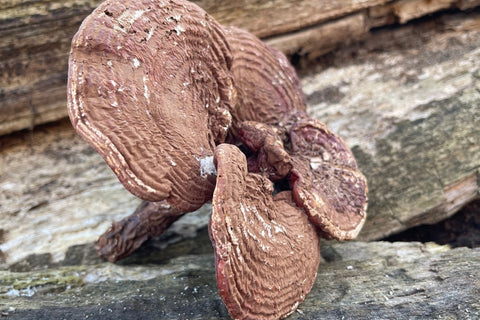
Reishi mushroom, also known as Lingzhi in traditional Chinese medicine, holds a revered status as the "Mushroom of Immortality." Its medicinal use dates back thousands of years, with ancient texts praising its ability to promote longevity and vitality. Rich in polysaccharides, triterpenoids, and antioxidants, Reishi offers a formidable array of health benefits for dogs.
Its immune-modulating properties make it particularly valuable for dogs with autoimmune conditions or those undergoing chemotherapy, as it supports immune function while reducing inflammation. Additionally, Reishi's adaptogenic qualities help the body adapt to stressors, promoting overall resilience and well-being.
Immune Support
Reishi mushroom contains a complex array of bioactive compounds, including polysaccharides and triterpenoids, that bolster the immune system. By activating immune cells and enhancing their function, Reishi helps dogs ward off infections and diseases, promoting overall health and vitality.
Antioxidant Protection
In addition to its immune-boosting properties, Reishi is rich in antioxidants such as ganoderic acids and ergosterol. These antioxidants scavenge free radicals and reduce oxidative stress, protecting cells from damage and supporting cellular health.
Liver Health
Reishi has been traditionally used to support liver function and detoxification in both humans and animals. Its hepatoprotective properties help maintain liver health and may benefit dogs with liver disease or toxin exposure.
Stress Reduction
As an adaptogen, Reishi helps the body adapt to stress and maintain balance. By modulating stress response pathways and promoting relaxation, Reishi can help dogs cope with anxiety, environmental stressors, and changes in routine.
Joint Health
Reishi's anti-inflammatory properties may alleviate symptoms of arthritis and joint pain in dogs. By reducing inflammation and cartilage degradation, Reishi supports joint health, mobility, and comfort in dogs with arthritis, hip dysplasia, or degenerative joint disease.
Turkey Tail Mushroom (Trametes versicolor)
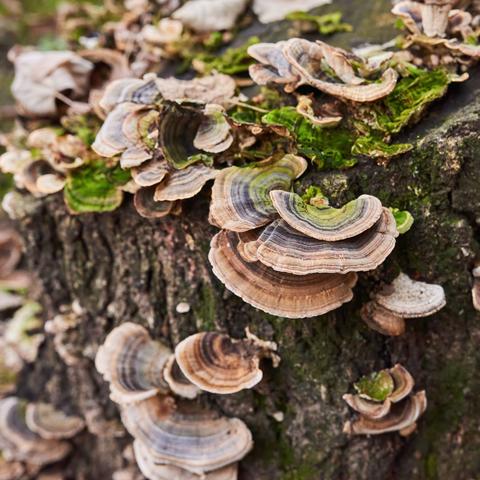
Named for its distinctive appearance resembling the colorful tail feathers of a turkey, Turkey Tail mushroom has long been revered for its immune-boosting properties. This mushroom contains potent compounds known for their ability to enhance immune function and combat infections.
For dogs battling cancer, Turkey Tail mushroom can complement conventional treatments by bolstering the immune system and improving quality of life. Moreover, its antioxidant properties help protect cells from oxidative damage, promoting longevity and vitality in dogs of all ages.
Cancer Support
Turkey Tail mushroom has garnered significant attention for its potential role in cancer therapy. Compounds like polysaccharopeptides (PSP) and polysaccharide-K (PSK) stimulate the immune system's anti-tumor activity and enhance the efficacy of conventional cancer treatments.
Gastrointestinal Health
Turkey Tail contains prebiotic fibers that nourish beneficial gut bacteria, supporting a healthy gut microbiome and digestive function in dogs. By promoting gut health, Turkey Tail may help alleviate gastrointestinal issues such as diarrhea, constipation, and inflammatory bowel disease.
Respiratory Health
Research suggests that Turkey Tail may have anti-inflammatory and antimicrobial effects in the respiratory tract. These properties make it potentially beneficial for dogs with respiratory infections, allergies, or chronic respiratory conditions.
Lion's Mane Mushroom (Hericium erinaceus)
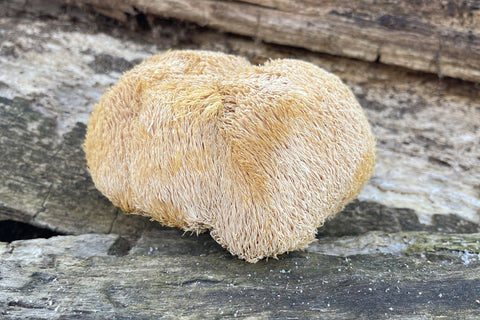
With its unique cascading appearance reminiscent of white icicles, Lion's Mane mushroom is as visually striking as it is beneficial for canine health. Renowned for its neuroprotective properties, Lion's Mane contains compounds that stimulate the production of nerve growth factor (NGF), promoting brain health and cognitive function in aging dogs.
Research suggests that Lion's Mane may also have therapeutic potential in managing neurological disorders such as cognitive dysfunction syndrome (CDS) in senior dogs. Furthermore, its prebiotic properties support gut health by nourishing beneficial gut bacteria, contributing to overall well-being.
Brain Health
Lion's Mane mushroom is prized for its neuroprotective properties, particularly its ability to stimulate nerve growth factor (NGF) production. NGF promotes the growth, maintenance, and repair of neurons in the brain, supporting cognitive function and neurological health in dogs of all ages.
Nerve Regeneration
Studies have shown that Lion's Mane may facilitate nerve regeneration and repair in cases of nerve damage or injury. This makes it a promising natural therapy for dogs recovering from neurological conditions, spinal injuries, or nerve trauma.
Anxiety and Behavior
Lion's Mane has been studied for its potential mood-regulating effects. By modulating neurotransmitter levels and promoting serotonin synthesis, Lion's Mane may help reduce anxiety, improve mood, and enhance overall well-being in dogs prone to stress or behavioral issues.
Shiitake Mushroom (Lentinula edodes)
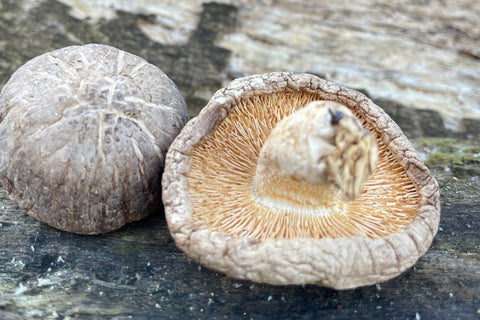
A staple in Asian cuisine, Shiitake mushroom offers a myriad of health benefits for dogs beyond its savory flavor. Rich in polysaccharides, Shiitake supports immune function and helps regulate cholesterol levels, promoting cardiovascular health in dogs. Its antimicrobial properties make it a valuable ally in combating infections, particularly for dogs prone to recurrent infections or allergies. Additionally, Shiitake's anti-inflammatory properties may alleviate symptoms of inflammatory conditions such as arthritis, enhancing mobility and quality of life for aging dogs.
Cardiovascular Health
Shiitake mushroom contains compounds like eritadenine and beta-glucans that support heart health and reduce the risk of cardiovascular disease. These compounds help regulate cholesterol levels, lower blood pressure, and improve blood vessel function in dogs.
Bone Health
Shiitake is a natural source of vitamin D, which plays a crucial role in calcium absorption and bone health. By promoting bone density and strength, Shiitake may help prevent osteoporosis and skeletal disorders in dogs, particularly seniors and large breeds prone to musculoskeletal issues.
Skin and Coat
Shiitake's anti-inflammatory and antioxidant properties may benefit dogs with skin conditions such as allergies, dermatitis, or hot spots. By reducing inflammation and promoting tissue repair, Shiitake supports skin health and enhances the luster and texture of the coat.
Maitake Mushroom (Grifola frondosa)
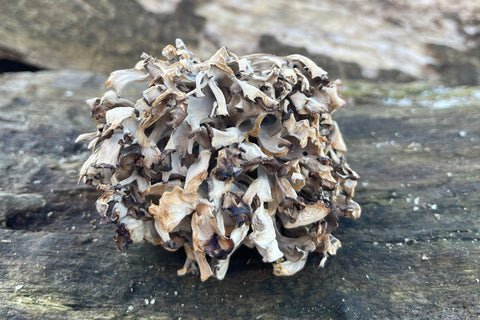
Affectionately known as the "Dancing Mushroom" due to its frilly appearance and alleged ability to bring joy, Maitake mushroom offers a treasure trove of health benefits for dogs. Packed with beta-glucans and polysaccharides, Maitake supports immune function and helps regulate blood sugar levels, making it a valuable supplement for dogs with diabetes or metabolic disorders. Its anti-inflammatory properties can also provide relief for dogs suffering from allergies or inflammatory conditions, promoting overall health and vitality.
Metabolic Support
Maitake mushroom contains compounds like beta-glucans and polysaccharides that help regulate blood sugar levels and improve insulin sensitivity. This makes it beneficial for dogs with diabetes, obesity, or metabolic syndrome, as it helps stabilize blood glucose levels and promote weight management.
Thyroid Function
Maitake has been studied for its potential role in thyroid health and hormone balance. Compounds found in Maitake may help regulate thyroid function and alleviate symptoms of thyroid disorders such as hypothyroidism or hyperthyroidism in dogs.
Conclusion
Incorporating these medicinal mushrooms into a dog's diet can offer a holistic approach to health and wellness, addressing a wide range of conditions and promoting overall vitality. However, it's important to source high-quality mushroom supplements specifically formulated for dogs and consult with a veterinarian before introducing any new supplements, especially if your dog has underlying health issues or is on medication. With proper guidance, these natural remedies can be valuable additions to your dog's wellness regimen, supporting their health and happiness for years to come.
References
Reishi Mushroom (Ganoderma lucidum)
Memorial Sloan Kettering Cancer Center: Reishi Mushroom https://www.mskcc.org/cancer-care/integrative-medicine/herbs/reishi-mushroom
Wu, G., Bao, Y., Li, X., He, H., & Wang, Z. (2015). Ganoderma lucidum (Lingzhi or Reishi) for adjuvant cancer therapy. Cochrane Database of Systematic Reviews, (4). https://www.cochrane.org/CD007731/GYNAECA_g-lucidum-reishi-mushroom-cancer-treatment
Zhu, J., Qiu, M. H., Sun, L. N., He, C. H., & Lin, Z. B. (2016). Immunomodulatory effects of Ganoderma lucidum polysaccharides on macrophage inflammatory protein-2 expression in mice with allergic asthma. International Journal of Molecular Sciences, 17(1), 71. https://bmcimmunol.biomedcentral.com/articles/10.1186/1471-2172-12-31
Turkey Tail Mushroom (Trametes versicolor)
Memorial Sloan Kettering Cancer Center: Turkey Tail Mushroom Coriolus versicolor | Memorial Sloan Kettering Cancer Center (mskcc.org)
Lai, P. C., Wu, J. M., & Ng, T. M. (2011). Scleroglucan (beta-glucan) derived from turkey tail mushroom Coriolus versicolor stimulates macrophage phagocytosis and cytokine secretion. Journal of Food Science, 76(2), M130-M138. https://www.ncbi.nlm.nih.gov/pmc/articles/PMC6889544/
Ma Y, Wu X, Yu J, Zhu J, Pen X, Meng X. Can polysaccharide K improve therapeutic efficacy and safety in gastrointestinal cancer? a systematic review and network meta-analysis. Oncotarget. 2017 Jul 6;8(51):89108-89118. doi: 10.18632/oncotarget.19059. PMID: 29179503; PMCID: PMC5687673.
Lion's Mane Mushroom (Hericium erinaceus)
International Journal of Medicinal Mushrooms: Hericium erinaceus (Lion's Mane) Improves Cognitive Function in Adults: https://www.ncbi.nlm.nih.gov/pmc/articles/PMC3099340/
Mori, K., Mori, M., Okawa, Y., Inatomi, S., & Nomoto, K. (2017). Daily oral administration of Hericium erinaceus mushroom extracts improves age-related cognitive decline in mice. Journal of Alzheimer's Disease, 57(2), 541-550. https://pubmed.ncbi.nlm.nih.gov/31413233/
Tang, W., Li, J., Liu, J., Tang, Y., & He, H. (2019). Hericium erinaceus (Lion's Mane) improves nerve growth factor levels in the hippocampus of Alzheimer's disease mice. Molecular Neurobiology, 56(1), 748-754. https://www.ncbi.nlm.nih.gov/pmc/articles/PMC6521003/
Shiitake Mushroom (Lentinula edodes)
Banerjee, P., Chatterjee, S., Ghosh, S., & Chandra, S. (2012). Shiitake (Lentinula edodes) mushroom: Biological activities and therapeutic potential. International Journal of Medicinal Mushrooms, 14(3), 227-242.
Maitake Mushroom (Grifola frondosa)
Journal of Medicinal Food: Maitake (Grifola frondosa) Improves Hyperglycemia and Insulin Resistance in Diabetic Rats: https://www.ncbi.nlm.nih.gov/pmc/articles/PMC3121104/
Friedman, M. (2006). Anticancer activities of Maitake (Grifola frondosa) mushroom: A review. International Journal of Medicinal Mushrooms, 8(1), 105-116.
World Journal of Gastroenterology: Maitake mushroom extracts for the treatment of type 2 diabetes mellitus https://www.ncbi.nlm.nih.gov/pmc/articles/PMC8875793/

